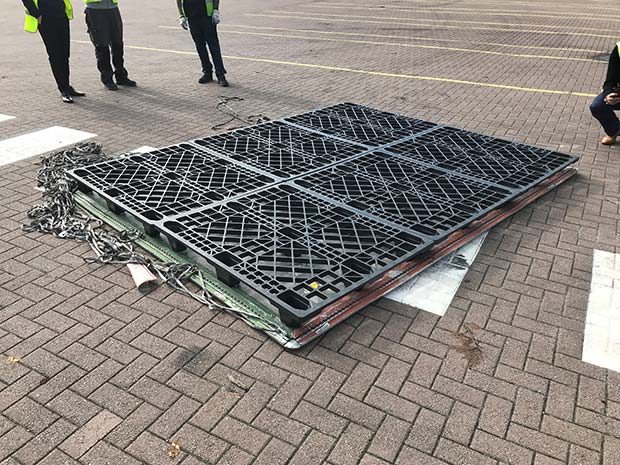With the impending chaos of Brexit and ISPM-15 regulations stretching the nation’s timber pallet supply to breaking point, businesses have been left scrambling for alternatives. INKA’s market leading PDP1210XW is making waves and turning the tide on perceptions surrounding plastic pallets.

Timber pallets have long dominated the export market, with their ease of access and keen price point historically making them the pallet of choice for exporters. It is estimated that, although lessening, around 80% of the European export pallet market is timber. However, with the UK’s imminent exit from the EU, the rules surrounding exporting are changing. As of January 1st, just like its citizens, Britain’s wooden pallets will no longer be able to travel throughout Europe with the same freedom that they had previously enjoyed. All wooden pallets must now be heat-treated and stamped to meet ISPM-15 requirements. This has led to a rush for, and subsequent price-hike on, such pallets as businesses dash to get their hands-on existing stocks, leaving producers struggling to cope with the vast increase in demand. This has only been exacerbated by businesses stockpiling their goods during the pandemic. INKA’s export pallets, which are all ISPM-15 compliant, offer the perfect solution to this issue. And with high stock levels, consistent pricing, and freedom from bureaucratic red tape, we can keep your supply chain moving.
In anticipation of the scramble for usable pallets post-Brexit, we have stockpiled our PDPXW range and are offering next day delivery nationwide if required. However, as strange as it may seem now, the shockwaves of Brexit will not last forever, and we are sure the timber pallet industry will adapt and recover. Therefore, we’re also keen to convey the non-Brexit related benefits of our plastic export pallets compared with timber, whilst quashing the main misconceptions surrounding their use – as we’re convinced the benefits make them not just a temporary stop-gap, but another ‘new normal’ for exporters in 2021.
Misconception 1 – ‘Plastic Pallets are expensive’
Yes, lots of plastic export pallets are very expensive compared to wooden alternatives, but that gap is narrowing. And now, with INKA’s new lightweight export pallet range, the gap is now completely closed. Our durable PDPXW pallets, with a dynamic capacity of 700 Kg, and available in standard (1200mm x 1000mm) and euro (1200mm x 800mm) sizes, are comfortably the most economical plastic export pallets on the UK market and are the first of their kind that can compete with new timber pallets on price.
These price benefits become even more apparent for exporters sending their goods by airfreight. Weighing in at just 5.2 Kg, our PDP1210XW is considerably lighter than standard wooden pallets. This becomes significant when pallet consignments are being charged per Kg on a volumetric basis (i.e. airfreight). The huge cost savings available here are obvious and make the switch to lightweight plastic pallets extremely compelling – even if businesses have traditionally acquired cheap second-hand timber pallets, or even use ‘free’ ones they have acquired in the past.
Moreover, due to their tapered pallet feet, the PDP1210XW allows for 6 x 1000x1200mm pallets to fit perfectly on a PMC – increasing space efficiency on an aircraft. Also, freight forwarders love businesses shipping on plastic pallets because they can go through their metal detectors without nails setting them off– so you might even be able to negotiate a better price with your forwarder when you tell them they won’t need to handball off the contents!
Misconception 2 – ‘Plastic Pallets are bad for the environment’
In this environmentally conscious world that we live in, certain plastics have a bad rep… and rightly so! Single-use plastics can be an ecological disaster. However, to paint all plastic products with one broad brush stroke is unfair. Our export pallets are made from 100% recycled materials and are completely recyclable at the end of their lives, which incidentally can be up to 3 times longer than the life of a wooden pallet. In fact, there are many now who argue that plastic pallets are the most environmentally friendly way to export your goods. As Joseph Grande puts it, ‘Black is the new Green’.
Misconception 3 – ‘Plastic pallets are awkward to use’
This could not be further from the truth! Whilst forklift drivers have become accustomed to wooden pallets and how they behave, the practical advantages of plastic export pallets are wide-ranging and compelling. Firstly, their light tare weights and smooth edges make manual handling a cinch for warehouse staff. Secondly, for food and pharmaceutical manufacturers, plastic pallets shed no foreign bodies so can move seamlessly from production areas to the warehouse, and beyond.
Finally, our range is far more space-saving than wooden options – with stacks of up to 80 pallets in a single space. They can also be stored outside with no detrimental effects to their use. This is significant for businesses who have previously enjoyed leaving their wooden pallets out in their yards but are now being forced to keep them covered to maintain their ISPM-15 credentials.
Here at INKA, we have a team of passionate friendly experts who are on hand to help your business to continue moving things forward!




Comments are closed.